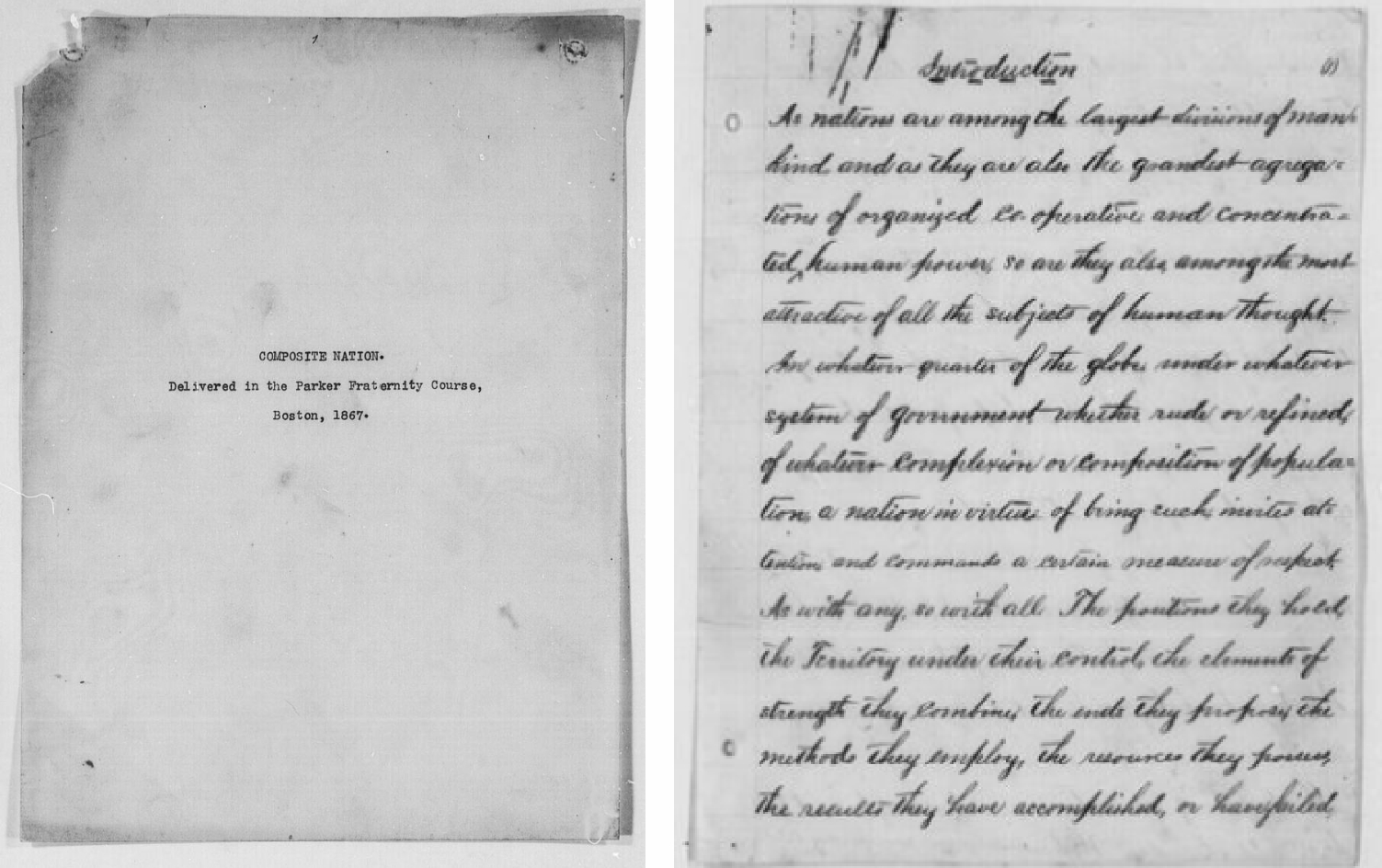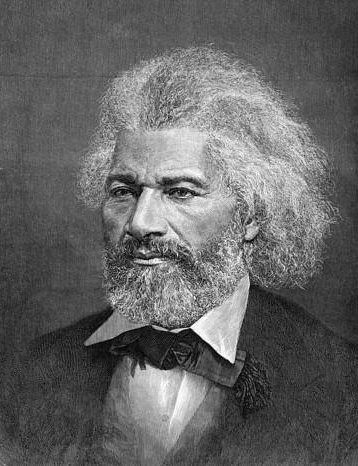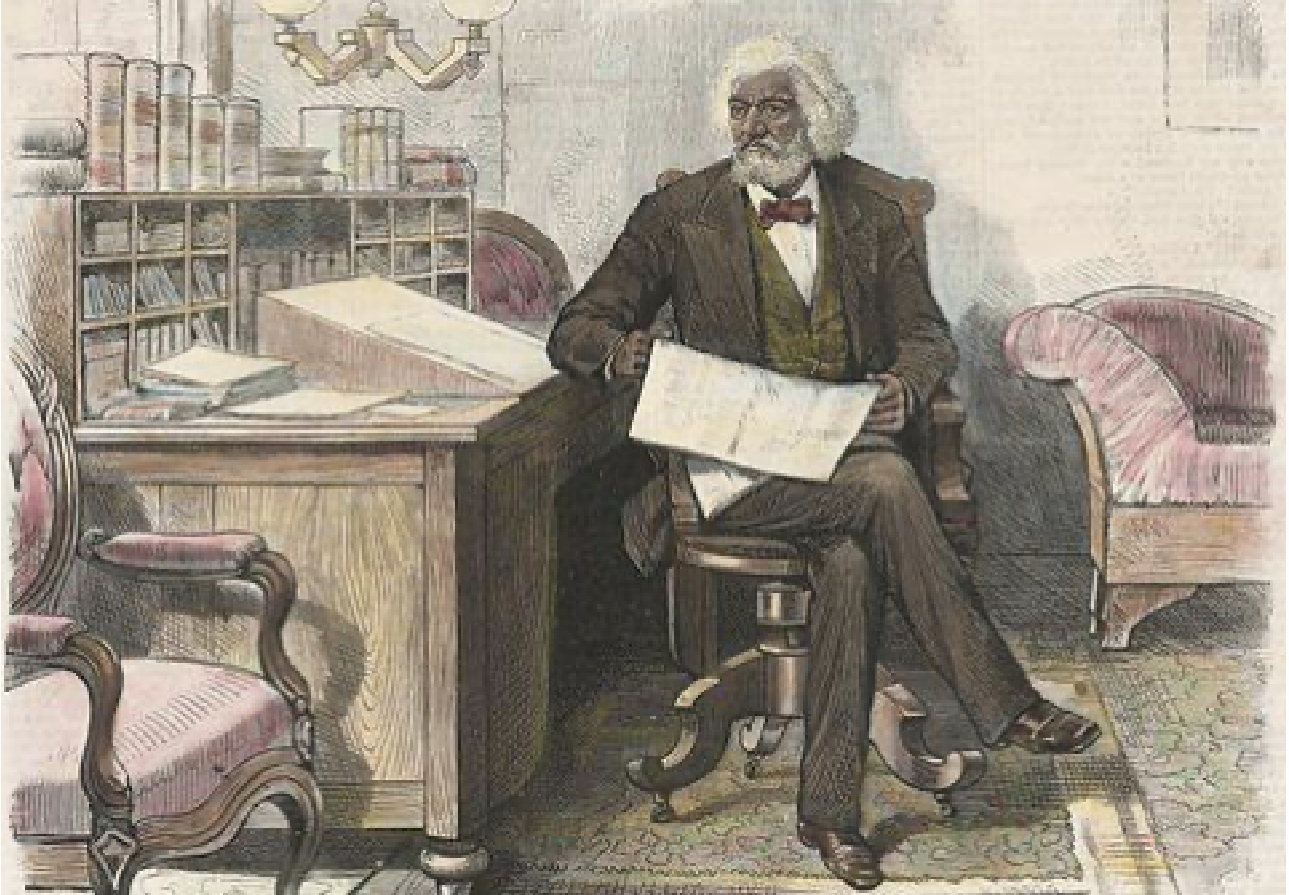1.3.2.0 - Frederick Douglass: Composite Nation Excerpts
Excerpted by Prabhneek (Niki) Heer
The Asian American Education Project
A portrait of Frederick Douglass, an African American abolitionist, orator, author, and newspaper publisher who escaped slavery and achieved renown for his oratory in the 19th century.
Frederick Douglass (1818-1895) was an African American abolitionist, orator, author, and newspaper publisher. Born enslaved in Maryland, Douglass was separated from his mother at an early age and spent his formative years with his maternal grandmother. With the help of Anna Murray, a freeborn Black woman whom he later married, Douglass escaped slavery in 1838. Years later, he attended an abolitionist meeting and became an agent of the Massachusetts Anti-Slavery Society and the American Anti-Slavery Society, traveling the country promoting abolition, and achieving renown as a skilled orator. In his 1860s "Composite Nation" lecture, Douglass analyzed nationhood to argue in favor of an America that embraced diversity and made the unique individuals and communities in the U.S. truly a part of the nation. This included arguing in favor of Chinese immigration as well as Asians and others. He advocated for citizenship and voting rights for all Asians and others in the U.S. This was at a time of intense and rising xenophobia in the U.S.

Left: Composite Nation primary source image of cover page.Douglass, Frederick, and Frederick Douglass. Frederick Douglass Papers: Speech, Article, and Book File, -1894; Speeches and Articles by Douglass, -1894; 1867, "Composite Nation," lecture in the Parker Fraternity Course, Boston, Mass.; 2 of 3. - 1894, 1846. Manuscript/Mixed Material. Retrieved from the Library of Congress,
https://www.loc.gov/item/mss1187900407/.
Right: Composite Nation primary source image of first page of the lecture. Douglass, Frederick, and Frederick Douglass. Frederick Douglass Papers: Speech, Article, and Book File, -1894; Speeches and Articles by Douglass, -1894; 1867, "Composite Nation," lecture in the Parker Fraternity Course, Boston, Mass.; 3 of 3. - 1894, 1846. Manuscript/Mixed Material. Retrieved from the Library of Congress,
www.loc.gov/item/mss1187900408/.
Excerpts from “Composite Nation”
“It is by comparing one nation with another, and one learning from another, each competing with all, and all competing with each, that hurtful errors are exposed, great social truths discovered, and the wheels of civilization whirled onward.
I am especially to speak to you of the character and mission of the United States, with special reference to the question whether we are the better or the worse for being composed of different races of men.”
Caption: Lithograph print of Douglass sitting at a desk and reading a newspaper.
I am especially to speak to you of the character and mission of the United States, with special
reference to the question whether we are the better or the worse for being composed of different
races of men.”
“We stand between the populous shores of two great oceans. Our land is capable of supporting one fifth of all the globe. Here, labor is abundant and here labor is better remunerated than any where else. All moral, social and geographical causes, conspire to bring to us the peoples of all other over populated countries.”
“There are such things in the world as human rights. They rest upon no conventional foundation, but are external, universal, and indestructible. Among these, is the right of locomotion; the right of migration; the right which belongs to no particular race, but belongs alike to all and to all alike. It is the right you assert by staying here, and your fathers asserted by coming here. It is this great right that I assert for the Chinese and Japanese, and for all other varieties of men equally with yourselves, now and forever. I know of no rights of race superior to the rights of humanity, and when there is a supposed conflict between human and national rights, it is safe to go to the side of humanity.”
“I reject the arrogant and scornful theory by which they would limit migratory rights, or any other essential human rights to themselves, and which would make them the owners of this great continent to the exclusion of all other races of men.
I want a home here not only for the negro, the mulatto and the Latin races; but I want the Asiatic to find a home here in the United States, and feel at home here, both for his sake and for ours.”
“Do you ask, if I favor such immigration, I answer I would. Would you have them naturalized, and have them invested with all the rights of American citizenship? I would. Would you allow them to vote? I would. Would you allow them to hold office? I would.”
Bibliography:
Douglass, Frederick, and Frederick Douglass. Frederick Douglass Papers: Speech, Article, and Book File, -1894; Speeches and Articles by Douglass, - 1894; 1867, "Composite Nation," lecture in the Parker Fraternity Course, Boston, Mass.; 1 of 3. - 1894, 1846. Manuscript/Mixed Material. Library of Congress,
https://www.loc.gov/item/mss1187900406/.




